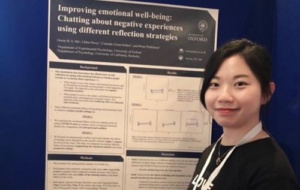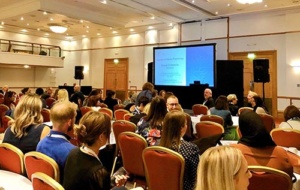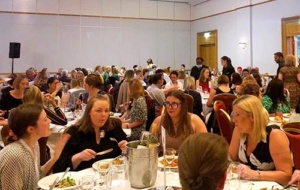Presenting: Improving Emotional Well-Being

My poster being presented at the Conference’s Poster Session.
Graduate Old Members’ Trust Report – Gloria Wai Shan Ma (2019, DPhil in Experimental Psychology)
The British Psychological Society’s Division of Health Psychology Annual Conference 2022
For the very first time, I had a chance to attend a live conference and presented one of my doctoral research projects titled “Improving Emotional Well-Being: Chatting About Negative Experiences Using Different Reflection Strategies” face-to-face to scholars from different institutions. The Annual Conference was hosted by the Division of Health Psychology of the British Psychological Society in Bristol between 28 and 29 June 2022.
Chatting typically follows the experience of an emotion. In times of distress (e.g., interpersonal conflicts, a persistent global pandemic), people are motivated to talk about their emotions by their desires for receiving support and feeling better. My project used online experiments to examine whether certain ways of chatting are more effective at regulating emotions than others, so we could maximise the benefits of social sharing in everyday and even clinical settings.

The opening of the conference.
On the first day of the Conference, I presented the key finding of this work using a poster—that is, cueing sharers to think about what happened from a broader perspective (i.e., reconstrue) led to greater emotional improvement than cueing them to focus on the emotionally arousing features of the event (i.e., recount). More interestingly, this finding was not affected by how much participants suspected that they were actually interacting with a chatbot rather than a real human. During the poster session, I received considerable attention from other researchers to the relatively underexplored research topic and positive feedback on the methodology used.
In return, I attended their presentations and particularly enjoyed the symposium by scholars from UCL. Their research addressed the different factors (e.g. socio-economic status, political views) that might have caused people to suffer more greatly (e.g. experiencing depression and anxiety) during the pandemic. There was also a structured discussion hosted by four exceptional female psychologists about how we should close the gap between research and practice. For example, should the government invite more researchers to take an active role in designing and even carrying out interventions, so that knowledge could be better transferred out of the ivory tower and into the real world? If the answer is yes, why has not this happened already and how can we push this to happen? Although I consider myself more of a social psychologist, I have found this Conference, which seemingly targeted health psychologists, extremely inspiring—not only do I share some similar research interests with the other attendees, but also do I (and I believe many researchers from other disciplines) often ask the same question of how we could make a real-world impact. Research may be flawed all the time, and there may still be a long way ahead before we develop a system that lets our hard work effectively reach the lay population, but it is encouraging to see that we are all contributing to the field and the world as much as we can in our own way.

Conference dinner on 28 June 2022.
One of the good things about live conferences is that there are more opportunities for people to actually socialise with each other, instead of just saying ‘hello’s and ‘bye’s or asking and answering questions through their screens. During the Conference dinner, I was very lucky to be seated with three graduate students and a professor, all from different universities and were very friendly. We chatted about our own research and some unforgettable life experiences (and of course how delicious the food was!) and exchanged contacts to keep in touch.
In summary, I am delighted and grateful that I was accepted to this Conference and granted travel funds by the College which greatly supported my trip, allowing me to learn from a huge group of intellectuals and develop new connections.
Find out more about the range of travel grants and scholarships available to assist Univ students on our Travel Grants page or read further travel reports.
Published: 9 August 2022
